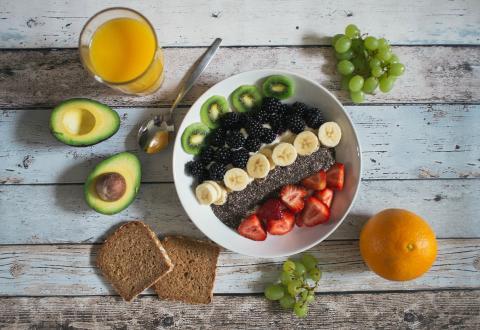
In our modern world, chronic and deadly diseases are a major problem that modern medicine is struggling to fix. In 2016, an estimated 595,690 died from cancer alone. While genetics do a play a role, we are not powerless to lower our risk of this deadly disease in all of its forms.
More and more studies are showing the power of dietary and lifestyle choices in lowering our risk of cancer. If you start young, you can easily incorporate these changes into your routine and simultaneously fight back against cancer as a result.
While there’s no singular cause for cancer, modern medicine has identified several risk factors that we can control by shifting our diet and sticking to healthier habits. It starts with eating right, but what are the best options?
Here are 5 ways you can lower your risk of cancer through diet and lifestyle changes.
1. Stay at a Healthy Weight
Obesity is tied to numerous deaths from cancer. The exact correlation between weight and cancer risk is unknown, but belly fat especially can put you at risk for cancers in the digestive system, or breast cancer for women.
How does your weight affect cancer risk? Scientific theories believe that overweight individuals have more pressure on their immune systems, more inflammation, and higher levels of insulin and estrogen. By integrating a healthy exercise regimen and eating right, you can get your weight under control and keep it there. This alone will lower your risk.
2. Eat Vegetables, Fruits, Legumes, & Superfoods
When you decide what to stock your pantry and fridge with, be sure to focus on things that offer a lot of nutritional value. Veggies and fruits are a great start, but you should also look for whole grains and beans that fall into the legumes family.
Simple additions to your diet like broccoli, fruits, carrots, Brussels sprouts, and tomatoes can go a long way. The biggest things to focus on are incorporating fiber and healthy fats and eliminating sugar and refined carbs. You should also look into the latest superfoods that offer a rich amount of vitamins and nutrients.
3. Keep Meat to a Minimum
Some studies have suggested a link between red meat and colon cancer. Other types of processed meat, like ham, bacon, and hot dogs, should also be eaten in moderation or not at all. You should get a majority of your protein from plant sources like beans and whole grains.
This doesn’t mean you have to be a vegetarian, but you should focus on lean meats like chicken that aren’t processed. The problem comes from the chemicals that are formed during the digestion of these types of meats. It’s also commonly thought that meat-eaters are at a higher risk because they consume fewer fruits and vegetables needed to lower your risk.
4. Curb Your Salt (Sodium) Intake
While there are no studies that directly tie sodium intake to cancer, salt has been shown to increase blood pressure and risk for heart disease. For these reasons, reducing your sodium intake is something most doctors will recommend.
Current dietary guidelines recommend 2,300 milligrams of sodium per day—or less if you can. You’ll find that processed foods are often higher in sodium than food we make and season ourselves. For example, frozen foods like Chinese dishes, pizzas, or junk foods often contain an entire day’s worth of sodium in a single serving.
5. Cut Down on Alcohol
There is evidence to show that alcoholic drinks can increase your risk for a number of different cancers. It is even more harmful when you combine it with smoking. The general guidelines state that women should not have more than one drink per day and men should not have more than 2.
A single serving is usually considered to be 1.5 fluid ounces of hard liquor, 5 ounces of wine, or 12 ounces of beer. Does the type of drinks matter? Not really. The culprit is ethanol, which is found in all types of drinks. Alcohol can be an irritant, and it can damage cells which causes them to repair and sometimes cause DNA mutations that could lead to cancer.
Make Healthy Choices Today
Our society is constantly trying to pressure us into unhealthy eating habits, but it’s important to consider our long-term health. These dietary and lifestyle changes can easily lower your risk of cancer by a large margin.
The concept of everything in moderation certainly applies here. We need to enjoy our lives, but keep in mind how we are balancing the things we eat and drink. How do you fight back against your risk of cancer? Let us know in the comments!








